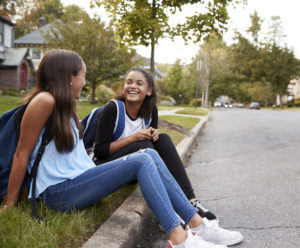How to Support Young People Aging Out of Foster Care

What happens when youth age out of foster care? The results vary dramatically among teens who age out with the continued support of a foster family, versus those who have no foster family support behind them.
What is Foster Care and What is the Goal?
Foster care is a safe place that provides a child and their birth family opportunities to resolve conflicts or disruptions and learn healthy skills so the child can safely return home. Many birth families need help to learn effective parenting skills, overcome substance use or learn healthy ways to cope from the trauma they themselves have experienced.
 Ultimately, the goal of foster care is family reunification. And more than half of children who enter foster care are safely reunited with their birth families. If a child cannot be safely reunited with his or her birth family, the goal becomes to find a permanent home for the child through adoption, relative placement, custodianship (guardianship) or, for older youth, independent living.
Ultimately, the goal of foster care is family reunification. And more than half of children who enter foster care are safely reunited with their birth families. If a child cannot be safely reunited with his or her birth family, the goal becomes to find a permanent home for the child through adoption, relative placement, custodianship (guardianship) or, for older youth, independent living.
Some young people who age out of the foster care system return to their biological families, explains Kelsey Smith, KVC Foster Care Supervisor. Sometimes, that’s a safe choice — but in other circumstances, returning can lead to detrimental outcomes. “Some biological families become safe over time, and some don’t,” she says. “Youth can fall into the cycle of why they came into care in the first place. These teens can be vulnerable to trafficking, substance abuse and domestic violence.”
Realities Youth Who Age Out of Foster Care May Face
Research on foster care youth supports this unfortunate reality. Of the estimated 26,000 youth who age out of foster care each year, only 58% will graduate high school by age 19, compared to 87% of teens not in foster care. These consequences continue as former foster care youth age. These young people are twice as likely to have a child by age 21 and less likely to live with their own children than other young people. More than 80% will be arrested by age 24, compared to 17% of youth not in foster care.

Kelsey Smith, Foster Care Supervisor
Without a safe home and compassionate care, teens who age out of foster care can struggle. What makes the difference might be your support. “When they have that support, that roof over their head and they choose to stay there, it can be amazing,” Kelsey notes. Studies show this support to have a tremendous impact. Youth in foster care who stayed with their caregivers were twice as likely to be working or be enrolled in high school at age 19 and complete at least one year of college.
It’s easy to see how foster care makes a positive impact for older teens. By being part of a genuine support system, you can make a difference in the life of a teen aging out of foster care.
5 Impactful Ways to Support Teens Aging Out of Foster Care
Know Your Resources
It might surprise you to find just how many resources there are for teens aging out of foster care. That’s one reason why it’s so essential you take on the responsibility of digging into these resources and getting the teens you know involved. From Opportunity Passport to Bridge to Independence and more, you can match your teen with funds and services that make a difference in their future. Additionally, many of these resources begin before a young person ages out of foster care, giving them much-needed time to prepare for independence.
Be an Advocate
“Many professionals in social services are overworked,” Kelsey relates. “If you feel like the child you know in foster care is slipping through the cracks, become an advocate yourself,” she says. You have the power to make calls and to make sure the young person gets the support they need. That may mean showing up to ensure stability in a workplace or living situation.
“Become a fierce advocate,” Kelsey advises. “Your effort will make a difference.”
Get to Know Their Support System
 If the child in foster care has a history of going missing, find out who they’re running to, Kelsey suggests. “Find their friends, and get to know who they hang out with at school. This can be intimidating, and safety always comes first, but when it’s appropriate, help the child build a support system.” These friends may be able to become roommates after high school or offer additional support. As a caregiver or friend, you can help a young person find and develop that support system beyond their biological or foster care family.
If the child in foster care has a history of going missing, find out who they’re running to, Kelsey suggests. “Find their friends, and get to know who they hang out with at school. This can be intimidating, and safety always comes first, but when it’s appropriate, help the child build a support system.” These friends may be able to become roommates after high school or offer additional support. As a caregiver or friend, you can help a young person find and develop that support system beyond their biological or foster care family.
Ask Hard (and Important!) Questions
Before assuming that a teen in foster care will follow a negative pattern, find out what they’re really looking for. Help them feel heard. Get to know them and ask the hard questions. What are they looking for as they become an adult? What support do they have? Are they working with an independent living worker? Ask with humility and seek to understand. You can help youth in foster care find their next foot forward.
Support Uplifting Organizations
If you don’t have a foster teen to support directly, you can still make a difference. Partner with nonprofit organizations that support former foster teens and others in need. “Youth that have aged out and don’t have anywhere to go may rely heavily on food banks and clothing donations,” Kelsey shares. “Reach out to nonprofits and supporting services. Find out what they do for former foster youth.” Donations and volunteer support of many kinds can help these vulnerable populations.
Partner with KVC Nebraska to Support Teens in Foster Care
You can join KVC Nebraska to support youth in foster care, individuals with disabilities and families. Register for KVC Nebraska’s 10th Annual Kids Classic Golf Tournament on Friday, September 9, 2022, in Ashland, Nebraska to help us raise money for the Resource Family Conference (RFC). Hosted at the beautiful Ashland Golf Club, golfers will enjoy 18 holes on a semi-private club located between Lincoln and Omaha.
The extraordinary Resource Family Conference helps Nebraska foster families and Shared Living Providers gain critical training and uplifting support. At the same time, youth in foster care and individuals with disabilities enjoy an incredible weekend of fun. Your support in this exciting golf tournament helps KVC continue to inspire and educate Nebraska’s resource families.
Feel inspired to learn more about supporting youth in foster care? Check out how to become a foster parent with KVC Nebraska and we’ll share everything you need to know before making this important decision.
